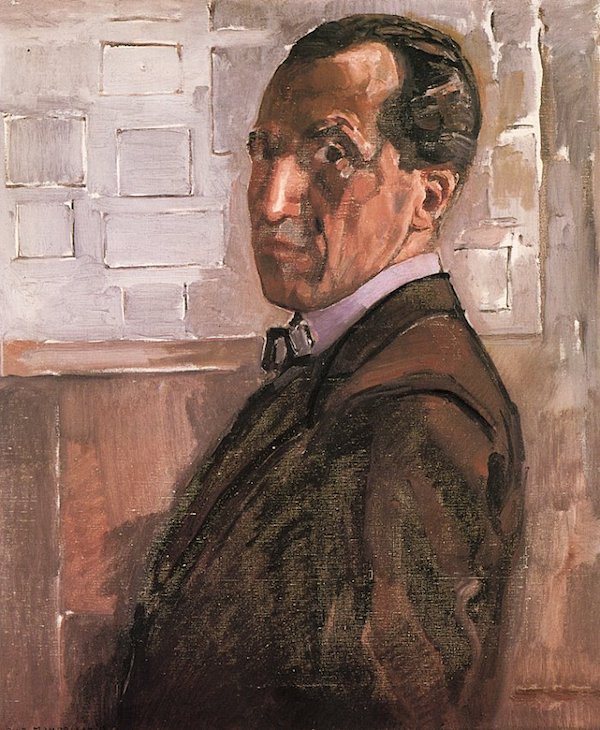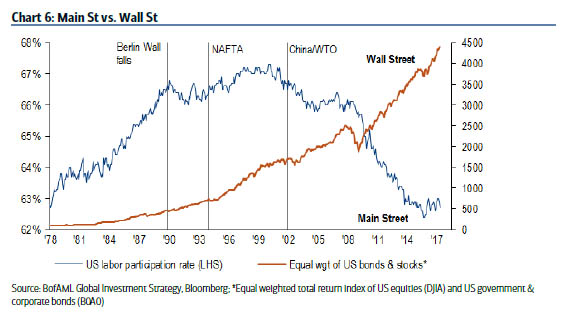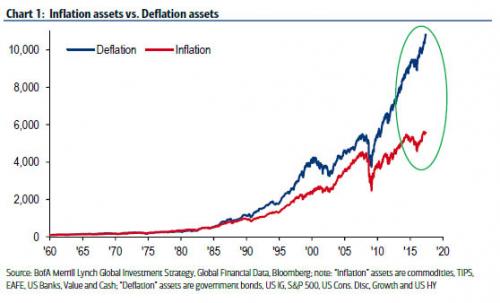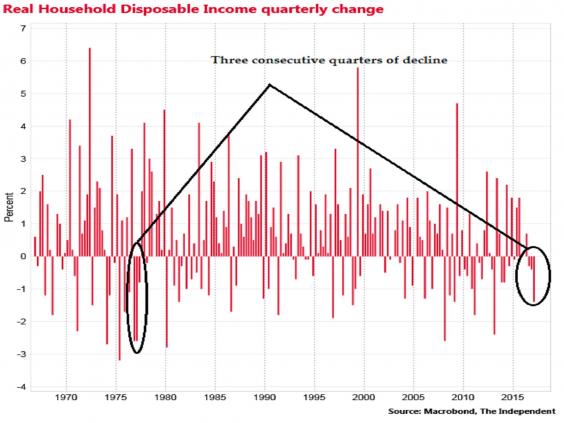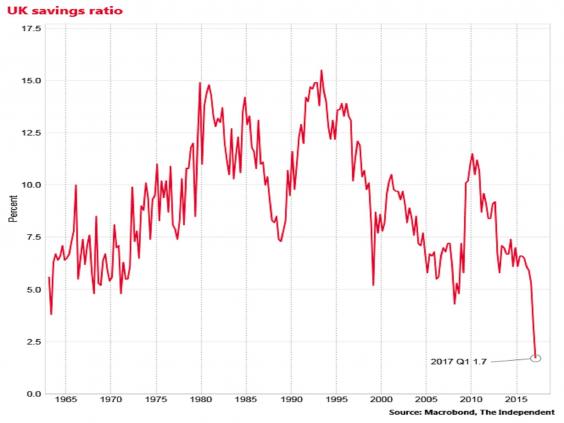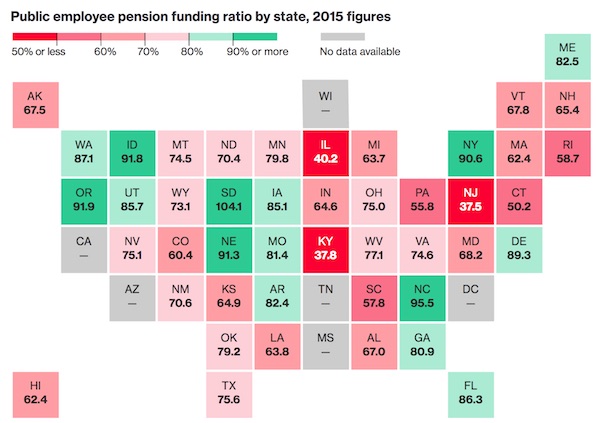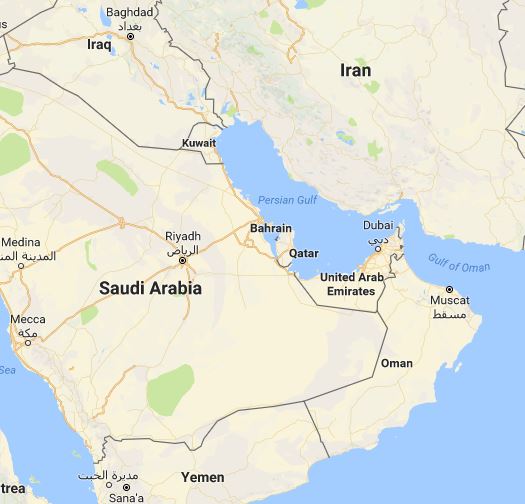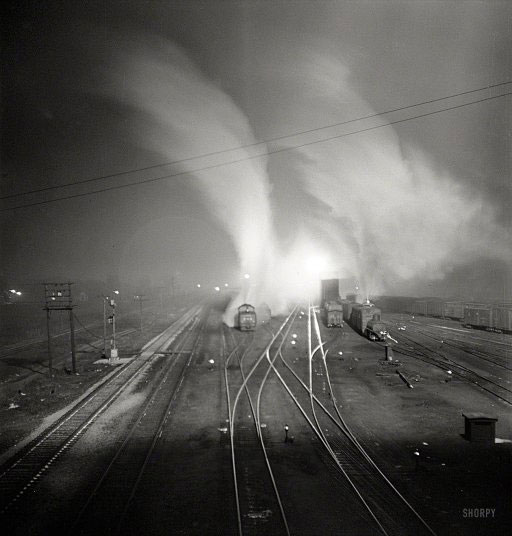
Jack Delano Freight train leaves Santa Fe rail yard for West Coast, Argentine, KS Mar 1943
Let’s assume for the moment that the two Guardian and Telegraph journalists who reported seeing 23 Russian army vehicles cross the border into Ukraine on Thursday were duped. Because if we don’t assume that, we must conclude they are accomplices, in a strange plot.
On Friday the Ukraine government, first through military spokesman Andriy Lysenko, and then through President Poroshenko, sent out a claim into the world that its army had destroyed a number of Russian vehicles on Ukraine territory.
It did, however, it’s an established pattern by now, not produce any evidence of that, no photos, no video, no satellite images and no parts from the allegedly destroyed tanks and armored personnel carriers, though “the majority of the machines” were said to have been destroyed.
Even the White House stated it had no evidence of the “attack”. And then went on to claim that Russia has vehicles and soldiers inside Ukraine all the time, something we’ve never seen any proof of either. Later, Germany’s Merkel told Putin to get his people and equipment out of Ukraine. Putin denied, as always, that there were any. This is what the UN said on July 31:
UN: ‘No Hard Evidence’ of Russia Supporting Ukraine Insurgency
The United Nations has not received any hard evidence that Russia supplied pro-Russian separatists in eastern Ukraine with weapons, the United Nations High Commissioner for Human Rights said Thursday. “We were unable to get hard evidence of the supply of weapons,” Pillay said. Washington and Kiev have both claimed they possess proof that Russia had been supporting the Ukrainian insurgency through the provision of military equipment.
If we assume that the two UK journalists didn’t make up the whole thing, but actually witnessed the vehicles cross the border, what did they really see? They reported recognizing Russian plates, and therefore assumed these were Russian vehicles. But they may as well have been someone else’s vehicles carrying Russian plates. We don’t know.
The part of Ukraine the vehicles supposedly entered is under rebel control. That begs the question: how did the Ukraine army get into rebel territory, unseen, destroy the vehicles, and get back into government controlled territory again, also unseen?
The Ukrainian army destroys Russian tanks in separatist-held territory. That’s quite a story. Only, it probably never happened. Which makes the Ukraine government a bunch of liars. But that’s nothing new.
What’s more troublesome is the role of NATO. Its new secretary-general, Anders Fogh Rasmussen, who’s looked trigger happy ever since he took the job, said that NATO had detected an “incursion” of vehicles from Russia on Thursday, and that “what we have seen last night is the continuation of what we have seen for some time.” Mr. Rasmussen doesn’t do evidence either.
So what happened and why did it happen? My best guess is that the Ukraine government saw the reports from the British journalists and decided to turn it into a story they thought would be good for their sake. Knowing western media would be eager to copy it and run it. And NATO. They never expected the US to state there was no evidence, because that didn’t matter much regarding earlier stories.
It could be a set-up, in which the journalists were guided to the place where the vehicles crossed the border, intended to make them write the story. Or they could be in on it.
Interfax has yet another twist, for which we have no proof either. The rebels suggest that Ukraine destroyed 100 of its own vehicles. That could have been an accident, like the downing of MH17 could have been, but don’t forget that we don’t know what or who ‘the Ukraine army’ really is. There are plenty reports of it being broke, poorly trained, poorly equipped, but on the other hand there are mercenaries, Blackwater and others, and there are Americans involved, CIA, who knows who else. Interfax:
The leadership of the self-proclaimed Donetsk People’s Republic has dismissed the Ukrainian government’s statement on destroying a convoy of what appeared to be Russian armored vehicles in eastern Ukraine. “We haven’t received any armored vehicles from Russia. No Russian units, including Russian armored vehicles, have crossed the border. Hence, no Russian armored vehicles could have been destroyed,” DPR First Deputy Prime Minister Andrei Purgin told Interfax on Friday evening. Purgin claimed that, on the contrary, the militias destroyed about 100 Ukrainian armored vehicles.”A lot of Ukrainian armored vehicles were destroyed today, 7 at one place, 12 at another. And the same all over the DPR territory. A total of about 100 of them.”
Another development in Ukraine is not quite as mysterious, but it still leaves a lot of questions. Only 3 weeks after voting it down, in the wake of which PM Yatsenyuk resigned, the Ukraine parliament (Rada) voted on Thursday for selling a 49% interest in the gas pipelines under its soil to western companies. On July 24, 221 members were for, this time, with Yats reinstated and proposing the bill, the tally rose to 228, a narrow victory.
US, EU Now Allowed To Buy Ukraine’s Gas Pipelines
Ukraine’s parliament has passed a law that will allow foreign companies from the US and EU to co-manage Ukraine’s national gas transportation system (GTS) which has a value of around $25-35 billion, one of the largest in the world. The motion, proposed by PM Arseniy Yatsenyuk, was only supported by 228 parliament members, just two more than the required 226 to adopt the bill. The first reading of the bill was approved on July 4. Ukraine will control 51% and foreign partners will be offered 49% in the venture, which seeks to “strengthen” Ukraine’s position as a transit state, according to the bill’s advocates.
Overshadowed by all the fighting, and hardly mentioned in the western media, this is a major development. And not everybody even inside Ukraine is happy about it.
Buy Firewood, Coal, Ukraine MP Warns After US, EU Get Access To Gas Pipes
The decision by the Ukrainian parliament to allow companies from the US and EU to co-manage the country’s gas pipelines could lead to the country being left with no gas supplies in the coming winter, an MP has warned in an emotional online address. Nikolay Rudkovsky, an independent MP in Ukraine’s Verkhovna Rada, believes the law allowing 49% of Ukraine’s national gas transportation system to be managed by foreign companies is a big mistake.
“People, my advice to you is: buy firewood and coal! After the law on reforming the management system of the united gas transportation system of Ukraine was passed today, our country has been left with almost no chances of staying with gas,” Rudkovsky said on Facebook. “Don’t the MPs understand that we are now guaranteed to have a winter with no heating?” he asked.
The bill, proposed by PM Arseny Yatsenyuk, has raised much controversy among Ukrainian MPs, who rejected it several times before the final approval on Thursday. One of the rejections, on July 24, is believed to have prompted Yatsenyuk’s resignation move, which was eventually dismissed by the Rada. Rudkovsky might have voiced the fears of quite a number of the bill’s opponents when he tried to speak out against passing of the bill on Thursday, but was silenced by the Rada Chairman Aleksandr Turchinov. “We don’t get a single cubic meter of gas from Russia now. This law gives away Ukrainian gas transportation system to the US,” Rudkovsky had time to say, before his microphone was switched off …
What’s more, in the same session the Rada also voted for sanctions on Russia.
• Ukraine Approves Law On Sanctions Against Russia
The Ukrainian parliament approved a law on Thursday to impose sanctions on Russian companies and individuals supporting and financing separatist rebels in eastern Ukraine. The government has already prepared a list of 172 citizens of Russia and other countries, and of 65 Russian companies, including gas export giant Gazprom, on whom they could impose sanctions “for financing terrorism”. Prime Minister Arseny Yatseniuk told parliament that Ukraine had taken a historic step. “By approving the law on sanctions, we showed that the country is able to protect itself,” he said. “The law should give a clear answer to any aggressor or terrorist who threatens our national security, our government and our citizens.” Ukraine said on Monday that European energy companies will have to agree major contract revisions when purchasing Russian natural gas if parliament approved sanctions on Gazprom.
Excuse me, Yats, but I don’t believe “the country is able to protect itself”. Not with an army reportedly still underpaid and undertrained. We all know that without questionable swastika brandishing storm troops alongside foreign mercenaries, all financed by US and EU support, there wouldn’t be much of an army. Whether that would be a good thing is another matter altogether, but don’t tell me you can protect yourself.
The dual measures of the sanctions against Russia and the sell-off of the gas pipeline system are the next steps in the western conquest of Ukraine. And they may not go as smoothly as Yats and Obama and Merkel seem to think and hope.
Slovakia reportedly prepares for “reverse flow” gas delivery to Ukraine, but that puts a serious risk on Slovakia’s own gas. And that is without even going into the actual process of reverse flow, or of the legal implications involved.
When the Ukraine government states that “European energy companies will have to agree major contract revisions when purchasing Russian natural gas“, that is at least as much of a threat to Europe as it is to Russia. And the bosses in Brussels may think that they are successful in their eastward conquest of everything right up to the Russian border, but Russians are not a stupid people.
Why would European nations want to renegotiate contracts with Russia’s Gazprom? And more importantly, why would Gazprom want to do that? Large swaths of Europe have no other possible gas source than Russia, and it would take years to change that. Of course people like Juncker and Barroso can dream of leaving millions of Europeans in the cold, and then blame Putin for that, but the PR war will stop somewhere.
In fact, while Slovakia says it’s preparing that reverse gas flow to Ukraine, its PM also had something else to say (he was whistled back on that by his president, who’s a ‘hard-liner’):
Slovak PM Warns “Meaningless” Russia Sanctions Will Hurt EU Economy
Slovakia’s prime minister criticized the European Union’s sanctions against Russia over Ukraine on Thursday, saying they would only threaten economic growth in the 28-member bloc. “Why should we jeopardize the EU economy that is beginning to grow?” Robert Fico told a news conference. “If there is a crisis situation, it should be solved by other means than meaningless sanctions. Who profits from the EU economy decreasing, Russia’s economy having troubles and Ukraine economically on its knees?” Fico also questioned Ukraine’s sanctions against Russia and said Slovakia must be prepared for a potential disruption of Russian natural gas supplies via Ukraine.
Other EU nations, Germany, Czech Republic, Greece, also signal they think things have gone too far. From the financial world comes Danish Danske Bank, which issued a report that views things from its own angle:
EU-Russia ‘Trade War’ To Finish Within 3 Months – Danish Biggest Lender
Reciprocal trade sanctions by Russia and the EU should not last longer than 3 months, as both economies will feel they can’t afford that, according to experts from Denmark’s largest bank, Danske Bank. “We believe an escalating trade war would be unbearable for both Russia and the EU, and that the EU will revoke the sanctions within one to three months, with Russia abolishing its own sanctions,” said the bank’s report called ‘The Ukrainian Crisis: the Nordic angle’. The report focuses on Nordic markets and said that should energy become involved in the dispute, the losses for both Russia and the EU would be sky-high.
3 months? Russia has 3 months. Does Europe? What if sanctions are lifted, but Russia still, in the negotiations needed after Ukraine’s sanctions, demands a premium because of damages it suffered from EU sanctions, which were based on unsubstantiated allegations against it? Or does anyone still think the evidence will suddenly pop up out of some dark corner?
But matters could get much worse for Europe. If the so-called “Ukraine army” keeps shelling and killing Russian speaking east Ukrainians, Putin may have no choice but to take a much harder stance on the diplomatic front, and perhaps the military as well. How long can he watch from a distance as what Russia considers fellow Russians are slaughtered? If California were to secede from America, what would the US do in such a situation?
In the meantime, that same “Ukraine army” has reportedly started heavy attacks on Lugansk, so the much maligned Russian aid convoy won’t be getting anywhere anytime soon.
One final point: while the Russian aid is being held up at the border, swamped by more allegations from the proven liars (yes, we do have proof of one thing here) in Kiev, how much aid for the people in east Ukraine has come from the US, EU and the Ukraine to date? It’s not as if they’re not suffering, we know that, it’s not as if they don’t desperately need supplies.
Why do US and EU send tons of supplies for the Yazidi in Iraq (who mostly weren’t even where the supplies were dropped), and none for Lugansk and Donetsk? Exactly whose PR spin machine are we caught up in here?









• US, EU Now Allowed To Buy Ukraine’s Gas Pipelines (RT)
Ukraine’s parliament has passed a law that will allow foreign companies from the US and EU to co-manage Ukraine’s national gas transportation system (GTS) which has a value of around $25-35 billion, one of the largest in the world. The motion, proposed by PM Arseniy Yatsenyuk, was only supported by 228 parliament members, just two more than the required 226 to adopt the bill. The first reading of the bill was approved on July 4. Ukraine will control 51% and foreign partners will be offered 49% in the venture, which seeks to “strengthen” Ukraine’s position as a transit state, according to the bill’s advocates.
Together with Western investors Ukraine is planning to create a new company that will control the country’s gas transit system. However, it could be hard to find investors willing to participate in the project, some analysts believe, as Russia is currently developing a transit system bypassing Ukraine’s territory, which has proved unreliable as a transit partner. Russia is building two pipelines that do not run through Ukraine to deliver natural gas to Europe. The Nord Stream is already complete, and once the South Stream is complete, Ukraine’s gas transportation system may lose more than 50% of its value. Earlier, the Ukrainian parliament rejected the measure to fully split Ukraine’s Naftogaz into two separate companies, which would help comply with Europe’s third energy package, which doesn’t allow one single company to both produce and transport oil and gas.
Read more …

• Buy Firewood, Coal, MP Warns After US, EU Get Access To Ukraine Gas Pipes (RT)
The decision by the Ukrainian parliament to allow companies from the US and EU to co-manage the country’s gas pipelines could lead to the country being left with no gas supplies in the coming winter, an MP has warned in an emotional online address. Nikolay Rudkovsky, an independent MP in Ukraine’s Verkhovna Rada, believes the law allowing 49% of Ukraine’s national gas transportation system (GTS) to be managed by foreign companies is a big mistake. “People, my advice to you is: buy firewood and coal! After the Law on reforming the management system of the united gas transportation system of Ukraine (#4116) was passed today, our country has been left with almost no chances of staying with gas,” Rudkovsky said on Facebook, following the Rada session. “Don’t the MPs understand that we are now guaranteed to have a winter with no heating?” he asked.
The bill, proposed by PM Arseny Yatsenyuk, has raised much controversy among Ukrainian MPs, who rejected it several times before the final approval on Thursday. One of the rejections, on July 24, is believed to have prompted Yatsenyuk’s resignation move, which was eventually dismissed by the Rada. Rudkovsky might have voiced the fears of quite a number of the bill’s opponents when he tried to speak out against passing of the bill on Thursday, but was silenced by the Rada Chairman Aleksandr Turchinov. “We don’t get a single cubic meter of gas from Russia now. This law gives away Ukrainian gas transportation system to the US,” Rudkovsky had time to say, before his microphone was switched off, according to ITAR-TASS. Turchinov accused the MP of lobbying for Russian interests.
Rudkovsky has asked Ukrainians to write petitions to the government, calling for the bill’s cancelation. “We can’t allow dozens of other Alchevsks to happen.” Around 1,500 people were left without gas in the town of Alchevsk, Lugansk Region of eastern Ukraine, earlier in August due to a malfunctioning gas pipe. Rudkovsky’s post has inspired dozens of worried comments, with Ukrainians sharing stories of electricity and water shortages they are already encountering, as well as fears of more to come. Earlier this month, Kiev announced turning off hot water throughout the city in an attempt to save gas for the winter months. The Ukrainian authorities have voiced concern over the country’s ability to ensure winter heating. Rudkovsky believes the government “failed” preparation for the winter. “There are other right ways of solving this problem, but the government does not hear me. I advised them to buy heating oil and transfer heating facilities to coal,” he said.
Meanwhile economic experts doubt Ukraine will actually be able to find the EU and US investors for its gas transportation system. Mikhail Korchemkin of East European Gas Analysis believes it’s risky to make such investments, as the future of the gas market is vague, Vedomosti reports. Energy Intelligence analysts argue the conflict in the east of Ukraine makes the project risky in general.
Read more …

• US Unable to Confirm Kiev Claims about Russian Military Vehicles (RIA)
Washington cannot confirm Kiev’s claims that a Russian military column crossed into Ukraine, US National Security Council (NSC) spokesperson Caitlin Hayden said in a statement Saturday. “We are working to gather more information regarding reports that Ukraine’s security forces disabled vehicles in a Russian military convoy inside Ukraine. We are not currently in a position to confirm these reports,” she said in a statement. However, Hayden added that the United States believed Russia to be providing the independence supporters with weapons and hardware and that Moscow could help de-escalate the situation by “stopping its supply of weapons, support and cash to separatists.”
Earlier, the United Nations also said it could not verify the reports that the Ukrainian forces hit Russian military vehicles inside Ukraine, and called for peaceful resolution of the conflict. The confrontation in Ukraine started when the Kiev-backed forces tried to suppress the independence supporters in eastern Ukraine who refused to acknowledge the authorities that came to power following the February 22 government coup. Russia has repeatedly denied its involvement in Ukraine’s internal affairs and called for a peaceful resolution of the Ukrainian crisis.
Read more …

• UN: ‘No Hard Evidence’ of Russia Supporting Ukraine Insurgency (Moscow Times)
The United Nations has not received any hard evidence that Russia supplied pro-Russian separatists in eastern Ukraine with weapons, the United Nations High Commissioner for Human Rights said Thursday. “We were unable to get hard evidence of the supply of weapons,” Pillay said in comments carried by ITAR-Tass. Washington and Kiev have both claimed they possess proof that Russia had been supporting the Ukrainian insurgency through the provision of military equipment. In the wake of the downing of Malaysia Airlines Flight MH17 on July 17, which claimed 298 lives, these accusations grew to a fever pitch.
Read more …

• Did Ukraine Attack Its Own Tanks? (Zero Hedge)
While today’s trading session was marked by news which at first blush correlated with what may be the 2014 equivalent of the Archduke Ferdinand shooting, in retrospect the newsflow made painfully little sense. Let’s recap:
- Yesterday afternoon, two UK reporters working for the Guardian and Telegraph, supposedly located by the border in east Ukraine, reported that they were “eyewitnesses” as a convoy of military trucks crossed the Russian border into the breakaway Donetsk republic, aka Ukraine. While there have been photos of the military trucks that have accompanied the Russian humantiarian convoy on Russian territory, there has so far been no proof, aside from said eyewitness reports, confirming Russian military vehicles entered or were in Ukraine.
- This morning Ukraine military’s spokesman, Andriy Lysenko, shocked the world when newswires reported that Ukraine forces had attacked an armed convoy from Russia, and “destroyed” a part of it. This was subsequently reiterated by the president of Ukraine himself who said that “the given information was trustworthy and confirmed because the majority of that machines had been eliminated by the Ukrainian artillery at night”, and by the secretary-general of NATO, Anders Fogh Rasmussen, who said that the alliance had detected an “incursion” of vehicles from Russia last night, adding that “what we have seen last night is the continuation of what we have seen for some time.” Alas, as in the case above, just more verbal reports, with zero actual evidence.
- Shortly thereafter, Russia responded when the Russian defense ministry said that there was no Russian military column that crossed into Eastern Ukraine, and that the above reports are based on “some fantasies.”
This is where the breakdown of logic occurs, because for Russia to make such a formal statement it clearly implies that Russia believes there is no evidence of destruction of a Russian convoy in Ukraine territory, something which obviously would exist if indeed as Ukraine’s president had claimed, the “majority of the machines had been eliminated.” If true, it also implies that either Ukraine had fabricated the entire story, and certainly the part about the destruction of the convoy and by extension that Russians had ever entered into East Ukraine. Furthermore, that would also suggest that the reports of the British reporters were also a fabrication.
Unless, of course, there is evidence, in which case the credibility of the both the Guardian and Telegraph reporters can be preserved, Ukraine can not be accused of fabricating a story to suit what some may say its own warmongering ambitions, and the onus is on Russia to explain why it lied about there being no invasion. More to the point, the onus is on Ukraine to present some evidence, in fact any evidence, of a destroyed Russian military convoy instead of merely building upon a story conceived by the two UK media outlets, because if Ukraine indeed has no evidence, then its story falls apart and what’s worse, the credibility and reputation of its government, of NATO and certainly of the UK press would be in tatters.
So what other possibility is there? Well, one that is all too unpalatable for Ukraine, namely that in its excitement to blow something up, it may have well destroyed some of its own military vehicles. A possible lead to such a turn of events comes from this Interfax report citing the leadership of the breakaway Donetsk People’s Republic.
The leadership of the self-proclaimed Donetsk People’s Republic has dismissed the Ukrainian government’s statement on destroying a convoy of what appeared to be Russian armored vehicles in eastern Ukraine. “We haven’t received any armored vehicles from Russia. No Russian units, including Russian armored vehicles, have crossed the border. Hence, no Russian armored vehicles could have been destroyed,” DPR First Deputy Prime Minister Andrei Purgin told Interfax on Friday evening. Purgin claimed that, on the contrary, the militias destroyed about 100 Ukrainian armored vehicles.”A lot of Ukrainian armored vehicles were destroyed today, 7 at one place, 12 at another. And the same all over the DPR territory. A total of about 100 of them,” Purgin said.
The implication is clear: while 100 or so Ukraine armored vehicles may or may not have been destroyed, one wonders if indeed the Ukraine army was responsible in “aiding” the separatists with what would appear to be a friendly-fire incident?
But perhaps the most damning evidence comes from none other than the White House itself, which according to CNN just admitted that while it accuses Moscow of “incursions “it can’t confirm the convoy was destroyed by Kiev.
Perhaps for the simplest reason that there is no evidence to help with the confirmation process? Which is rather unpleasant, because as explained above, without confirmation of a destroyed convoy, the whole story falls apart as merely yet another unprecedented warmongering fabrication, one involving not only the Kiev regime, but NATO and the UK press as well! What is worse, is that if indeed the specter arises that Ukraine is lying about an event that nearly gave the market a heart attack on the belief that a new international war involving Russia may be about to break out, was Ukraine also lying about flight MH-17. And what else may the Kiev regime have been lying about?
Read more …

• Russia Assures US On Aid Convoy (BBC)
Russia’s defence secretary has assured his US counterpart that there are no military personnel in its controversial aid convoy for Ukraine, the US says. It said Sergey Shoygu told Chuck Hagel the convoy was not being used as a pretext to intervene further. The convoy, which aims to aid eastern Ukrainian cities held by pro-Russian rebels, is still stalled at the border. Earlier Russia denied Ukraine’s claims that a column of Russian armoured vehicles had crossed the border. The Pentagon said Mr Hagel had sought clarification on the convoy. It said: “Minister Shoygu ‘guaranteed’ that there were no Russian military personnel involved in the humanitarian convoy, nor was the convoy to be used as a pretext to further intervene in Ukraine.” It said: “Minister Shoygu assured Secretary Hagel that Russia was meeting Ukraine’s conditions.”
Read more …

• Ukraine And Slovakia Plan To Start Reverse Flow Gas In September (RT)
Ukrtransgaz, Ukraine’s national pipeline operator, has completed all the necessary construction to accept 27 million cubic meters of gas per day from Slovakia through 2019. The operations are due to start on September 1. All technical aspects and negotiations have been agreed upon by Ukraine’s Uktransgaz and Slovakia’s Eustream AS, Ukraine’s state oil and gas company Naftogaz said on Wednesday. Natural gas will flow from Slovakia to Uzhgorod, a town in western Ukraine. Though the natural gas will help Ukraine with its depleting natural gas reserves, the 27 million cubic meters is still only 1/4 of what Moscow used to send every day. Deliveries from Slovakia could satisfy up to 20% of Ukraine’s natural gas demand, which in 2013 was 55 billion cubic meters. The two companies first signed a Memorandum of Understanding on April 28, 2014 to provide reverse flow gas supplies to Ukraine. The concept of ‘reverse-flow’ means re-exporting Russian gas delivered to Slovakia to Ukraine. Gazprom, the supplier, maintains this is illegal under existing contracts.
Ukraine is seeking reverse-flow gas because it can no longer import gas from Russia, which stopped non pre-payment gas deliveries in June, after Kiev had accumulated more than $5 billion in unpaid gas bills. In July, Slovakia began seeking partners to send natural gas to Ukraine, however, not many parties were eager to start business with Kiev, notorious for not paying its gas bills. Naftogaz, Ukraine’s national oil and gas company, estimated in July that the country has another 6 billion cubic meters to burn before running out, likely in December. Gazprom Deputy CEO Vitaly Markelov has estimated Ukraine needs 18.5 bcm of gas to keep the heat on until December. On Tuesday, Ukraine announced it will halt the supply of Russian gas through its territories. The government had set up a strict regime to save up gas for winter – turning off hot water at most Kiev residences and even proposed decreasing the minimum room temperature in homes down to 16 degrees Celcius from 18 degrees. Europe bought about 160 billion cubic meters of Russian gas in 2013, according to Gazprom, providing for 35% of EU’s total gas consumption. Slovakia itself is preparing for a halt in Russian gas supplies through Ukraine.
Read more …

• Slovak PM Warns “Meaningless” Russia Sanctions Will Hurt EU Economy (Reuters)
Slovakia’s prime minister criticized the European Union’s sanctions against Russia over Ukraine on Thursday, saying they would only threaten economic growth in the 28-member bloc. “Why should we jeopardize the EU economy that is beginning to grow?” Robert Fico told a news conference. “If there is a crisis situation, it should be solved by other means than meaningless sanctions. Who profits from the EU economy decreasing, Russia’s economy having troubles and Ukraine economically on its knees?” Fico also questioned Ukraine’s sanctions against Russia and said Slovakia must be prepared for a potential disruption of Russian natural gas supplies via Ukraine. Russia cut gas supplies to Ukraine on June 16 in a dispute over unpaid bills but so far has continued to supply gas which Ukraine sends on to Russia’s other customers. However, intensified fighting in eastern Ukraine between Ukraine’s forces and pro-Russian separatists and escalating tit-for-tat sanctions between Russia and the EU have raised fears of a disruption of deliveries to Europe.
The Ukrainian parliament approved a law on Thursday to impose sanctions on Russian companies and individuals supporting and financing separatist rebels in eastern Ukraine. Ukraine’s government has already prepared a list of 172 citizens of Russia and other countries, and of 65 Russian companies, including gas export giant Gazprom, on which they could impose sanctions “for financing terrorism”. Fico said it was “strange” that Ukraine, after signing an association agreement with the EU, was taking “unilateral steps that … threaten the individual economic interests of EU member states.” Europe takes about a third of its gas imports from Russia, and about 40 percent of that amount flows through Ukraine and into the west via Slovakia. When asked about potential disruptions, during a meeting with representatives of main Slovak gas companies, SPP and Eustream, Fico said, “We must be prepared that such a situation can actually come about.”
Read more …

• EU-Russia ‘Trade War’ To Finish Within 3 Months – Danish Biggest Lender (RT)
Reciprocal trade sanctions by Russia and the EU should not last longer than 3 months, as both economies will feel they can’t afford that, according to experts from Denmark’s largest bank, Danske Bank. “We believe an escalating trade war would be unbearable for both Russia and the EU, and that the EU will revoke the sanctions within one to three months, with Russia abolishing its own sanctions,” said the bank’s report called ‘The Ukrainian Crisis: the Nordic angle’. The report focuses on Nordic markets and said that should energy become involved in the dispute, the losses for both Russia and the EU would be sky-high. Russia is Europe’s biggest gas supplier providing about 30% of the region’s total demand.
Experts say the Ukrainian crisis will have a modest direct impact on the European economy, with the biggest risk coming from negative sentiment. Finland is thought of as the most vulnerable country, and is expected to contract 0.2 percent this year. This is because the country’s trade, tourism and foreign direct investment are closely connected with Russia and Ukraine. Scandinavian countries are expected to feel a limited affect. Norway may even benefit from sanctions long term, if Europe starts using Norwegian gas as an alternative to Russian supplies, the report concluded.
Read more …

• Kiev Says Forces Destroyed Russian Armour Inside Ukraine (Reuters)
Ukraine said its artillery destroyed part of a Russian armoured column that entered its territory overnight and said its forces came under shellfire from Russia on Friday in what appeared to be a major military escalation between the ex-Soviet states. Russia’s government denied its forces had crossed into Ukraine, calling the Ukrainian report “some kind of fantasy”, and in turn raised its own serious concerns about activity by the U.S.-led NATO defence alliance near its borders. Moscow accused Kiev of trying to sabotage aid deliveries to eastern areas torn by fighting between pro-Russian separatists and the Western-backed government of Moscow’s former satellite. In a call to U.S. Defense Secretary Chuck Hagel, as reported by Russia’s state news agency RIA, Defence Minister Sergei Shoigu said Moscow was “seriously concerned” by increased NATO activity and called for a ceasefire to get aid into Ukraine. The agency did not specify what Western military movements he meant.
The Pentagon said in a statement that Hagel had sought clarification about the Russian convoy during the phone call and was “guaranteed” it did not include Russian military personnel and would not be used as a pretext for intervening in Ukraine. NATO said there had been a Russian incursion into Ukraine, which is not a member of its mutual defence pact, but it avoiding calling it an invasion. Other European capitals accused the Kremlin of escalating a conflict that has revived Cold War-era animosities and chilled the region’s struggling economies. The White House, which said it could not confirm that a Russian military convoy had crossed the border, warned Moscow that any intervention into Ukraine without Kiev’s permission was unacceptable. The United Nations said it could not verify the reports from the Ukrainian border but called for an immediate de-escalation.
Read more …

• Ukraine Tensions Flare as Poroshenko Touts Strike on APCs (Bloomberg)
Tensions flared in Ukraine yesterday as the government said its army destroyed part of a column of military vehicles that crossed the border from Russia, even as Vladimir Putin denies any military presence in the country. President Petro Poroshenko said Ukrainian forces destroyed part of a column that had arrived from Russia. The Foreign Ministry in Moscow rejected the statement and warned about a potential attack on another convoy that carries aid. Ukraine’s top diplomat, Pavlo Klimkin, said he will meet with his Russian, German and French counterparts tomorrow in Berlin. The incident adds to the tension building over Russia’s plan to send about 275 trucks with what it says is humanitarian aid to rebel-held areas in eastern Ukraine. Even with Ukraine saying it doesn’t see the armed vehicles as the sign of potential invasion, their arrival raised the stakes, said Volodymyr Fesenko, of the Penta research institute in Kiev.
“It was a gut check to see if Ukraine will defend itself,” said Fesenko, the head of the political think tank. If Russia “reacts in any way, that would mean that they confirm this convoy was a Russian one, and thus that Russia made a military intervention into Ukrainian territory. But I do not think it will.” No military column from Russia crossed into Ukraine, said Major General Igor Konashenkov, a spokesman for the Defense Ministry in Moscow, according to the Russian state-run news service RIA Novosti. Ukraine’s comments are based on “fantasies” and shouldn’t be the “subject of serious discussion,” he said, according to RIA. Ukraine’s statements on the armed convoy amount to “provocation” and are part of an “information war,” Maria Zakharova, a spokeswoman for the Russian Foreign Ministry, said by phone. The government in Kiev is seeking to aggravate the conflict and drag Russia into it, she said.
Read more …

Who? We?
• Canada Releases Atrocious Jobs Data; Then Revises It Higher (Zero Hedge)
A week ago, Canada released a jobs number that was a simply put a disaster: instead of creating the 20,000 jobs analysts had expected, the country’s Statistics bureau reported that a tiny 200 had been added in the month of July, following a drop of 9,400K the month before. This promptly led to screams of pain and howls of bloody murder – after all the data is clearly not allowed to show negative trends: as the Globe and Mail reported, National Bank chief economist Stéfane Marion was among the more optimistic forecasters, with an expectation that July will actually show a net gain of 30,000 jobs and who immediately took offense with the report. “That was mind-boggling,” he said. “These are numbers we don’t see outside recessions. I just don’t believe we’re in a recession, so therefore I would expect the full-time employment numbers to be [higher].”
And sure enough, since one can’t possibly have a recession in a centrally-planned world, just hours after the release, and following the outcry from the cognitive dissonance, Statistics Canada yielded to pressure for a correction and promptly admitted it had made a mistake and was forced to correct its report. However instead of pulling a laughable ISM “seasonal adjustment glitch” excuse, the agency said it failed to count workers who should have been categorized as full-time employees, even though it clearly did count most full-time employees. Just not those that were critical to keep the illusion going. Which is why this morning it was take two for the Canada jobs print, which was as follows: In July, Canada employment increased 41.7K in July according to Statistics Canada’s second attempt, from -9.4K in prior month. This was about 41K higher than the previous “erroneous” print, and double the original estimate: high enough to make everyone happy. In fact, it was so high, it surpassed the highest range of the forecast, which topped out at 41.4K based on 20 economists.
Read more …

Yeah, why not? Long as you can just print it out of thin air anyway …
• US Aid To Iraq May Speed Up Despite Billions Already Spent (Reuters)
The United States may accelerate U.S. economic and military aid to Iraq with the end of Nuri al-Maliki’s eight-year reign but will first want proof that the country’s new leaders have abandoned his sectarian ways. Maliki’s surprise announcement that he would give way to Haider al-Abadi as Iraq’s prime minister removes the man blamed by Washington for the revival of vicious sectarianism in Iraq and the advance of the Islamic State deep into Iraqi territory. U.S. officials said his departure, which may not occur until September, could open the door to greater military and economic assistance to a new Iraqi government if it adopts an inclusive agenda. Despite saying the United States had no intention of “being the Iraqi air force,” President Barack Obama has also suggested U.S. air strikes could go on for months to help Iraqis fend off Islamic State fighters seeking to establish a hub of jihadism in the heart of the Arab world.
Obama, however, faces two important questions: can Abadi’s new government unite Iraqis after his predecessor helped drive the Sunni minority into the jihadist camp? And is the U.S. public willing to pour more taxpayer money into a country that cost it billions of dollars and thousands of American lives since the 2003 U.S.-led invasion that toppled Saddam Hussein? “Whatever future military assistance we continue to provide to Iraq won’t be tied specifically or solely to the new prime minister,” said a U.S. defense official who spoke on condition of anonymity to discuss sensitive military planning. “To say that now that there’s a new guy it will open the floodgates would be way overstating this.” A second U.S. defense official said the United States would be looking for the next government to integrate the fragmented Iraqi security forces and to provide assistance to the Kurdish minority. But putting a new government program in place will take time, suggesting the measured pace of the administration’s response to the Islamic State advance will continue.
“If all those conditions start getting set, then I think you will see the possibility of us accepting an invitation to do more substantive train, advise and assist,” the official said. But if this happens, the official added, it would be slow and may take a year. In the meantime, targeted air strikes and the provision of U.S. military equipment such as Apache helicopters are expected to continue. Obama, who campaigned on promises to end the U.S. wars in Iraq and Afghanistan, has not yet decided how much more U.S. military action or weaponry he might support in Iraq, said a third U.S. official. “We’ve seen the first press allegations of a slippery slope,” said this official, who also spoke on condition of anonymity. “So you can be sure that people are concerned about what these next steps mean.”
Read more …

Not everyone fights for the same things.
• Indian Premier Promises Banking Access for All Families (NY Times)
In a speech meant to set a national agenda for his new government, Prime Minister Narendra Modi on Friday announced plans to make bank accounts available to every Indian family, a complex goal that, if successful, could allow the government to eventually convert subsidies for food, fuel and fertilizer into cash transfers. Mr. Modi’s Independence Day speech came about two months after a landslide victory in parliamentary elections and amid daunting expectations that his Bharatiya Janata Party would return India to the path of economic growth and create jobs for the millions of young people who enter the labor market every year. Mr. Modi, 63, departed from the formal style of his predecessors, speaking for more than an hour without notes and describing himself as a newcomer to the capital, “untouchable to the elite class of Delhi.” He also refused the screen of bulletproof glass that has been erected to protect previous prime ministers.
A former outreach worker for a right-wing Hindu organization, he used his Independence Day speech to entreat Indians to act in the interest of the nation, saying he had been struck by the degree of infighting and self-interest he had encountered since moving to the capital. “The time has come to think seriously about whether we have a national character or not,” he said. “Today, unfortunately, the atmosphere is that if you go to anybody for work, that person will immediately ask, ‘What is in this for me?’ When he learns that there is nothing for him, he will say, ‘Why should I?’ We have to break out of this cycle of ‘what is in this for me’ and ‘why should I?’ We need to shine our national character.” With food inflation unabated since the election, Mr. Modi has been under pressure from supporters to flesh out his campaign promises with bold economic changes.
The government’s first budget, presented in July, suggested that Mr. Modi’s government would tinker with, not dispose of, the economic policies it inherited, despite his relentless criticism of the Indian National Congress’s economic record during the campaign. Mr. Modi’s promise to provide the poor with bank accounts may address some of that impatience, pointing to a long-term goal of converting distribution systems to cash payments, which would greatly reduce corruption and increase consumer spending. Account holders would be provided with a debit card and an insurance policy of up to 100,000 rupees, or about $1,600. Mr. Modi said the programs could lessen the suffering of farmers, many of whom commit suicide under financial pressure. “For his daughter’s marriage, a poor man takes a loan from the moneylender that he cannot return,” he said.
Read more …

